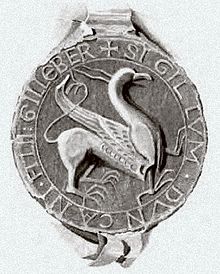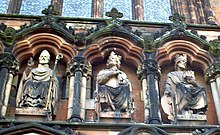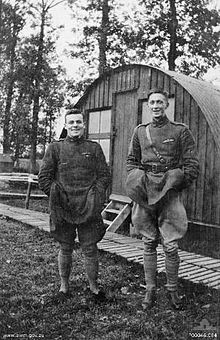Portal:History
The History Portal
History (derived from Ancient Greek ἱστορία (historía) 'inquiry; knowledge acquired by investigation') is the systematic study and documentation of the human past. History is an academic discipline which uses a narrative to describe, examine, question, and analyze past events, and investigate their patterns of cause and effect. Historians debate which narrative best explains an event, as well as the significance of different causes and effects. Historians debate the nature of history as an end in itself, and its usefulness in giving perspective on the problems of the present.
The period of events before the invention of writing systems is considered prehistory. "History" is an umbrella term comprising past events as well as the memory, discovery, collection, organization, presentation, and interpretation of these events. Historians seek knowledge of the past using historical sources such as written documents, oral accounts or traditional oral histories, art and material artifacts, and ecological markers.
Stories common to a particular culture, but not supported by external sources (such as the tales surrounding King Arthur), are usually classified as cultural heritage or legends. History differs from myth in that it is supported by verifiable evidence. However, ancient cultural influences have helped create variant interpretations of the nature of history, which have evolved over the centuries and continue to change today. The modern study of history is wide-ranging, and includes the study of specific regions and certain topical or thematic elements of historical investigation. History is taught as a part of primary and secondary education, and the academic study of history is a major discipline in universities.
Herodotus, a 5th-century BCE Greek historian, is often considered the "father of history", as one of the first historians in the Western tradition, though he has been criticized as the "father of lies". Along with his contemporary Thucydides, he helped form the foundations for the modern study of past events and societies. Their works continue to be read today, and the gap between the culture-focused Herodotus and the military-focused Thucydides remains a point of contention or approach in modern historical writing. In East Asia a state chronicle, the Spring and Autumn Annals, was reputed to date from as early as 722 BCE, though only 2nd-century BCE texts have survived. The title "father of history" has also been attributed, in their respective societies, to Sima Qian, Ibn Khaldun, and Kenneth Dike. (Full article...)
Featured picture
Did you know (auto generated)

- ... that a reviewer called Black Krrsantan one of "the scariest characters in Star Wars history"?
- ... that pianist and composer Josef Weiss created the first film score in the history of German cinema?
- ... that Chunyu Yi may have been the "ancient founder of the case history tradition"?
- ... that Art Rooney Jr. presided over what one Pro Football Hall of Fame selector described as "the best drafting run in NFL history"?
- ... that Group A of the 2006 FIFA World Cup featured the highest-scoring opening game in World Cup history since the competition began using a single match opening format?
- ... that an exhibition hall for the 1939 New York World's Fair later hosted athletic events at a historically Black university in Virginia?
Marian Adam Rejewski (Polish: [ˈmarjan rɛˈjɛfskʲi] ; 16 August 1905 – 13 February 1980) was a Polish mathematician and cryptologist who in late 1932 reconstructed the sight-unseen German military Enigma cipher machine, aided by limited documents obtained by French military intelligence.
Over the next nearly seven years, Rejewski and fellow mathematician-cryptologists Jerzy Różycki and Henryk Zygalski, working at the Polish General Staff's Cipher Bureau, developed techniques and equipment for decrypting the Enigma ciphers, even as the Germans introduced modifications to their Enigma machines and encryption procedures. Rejewski's contributions included the cryptologic card catalog and the cryptologic bomb. (Full article...)
On this day
- 1760 – The chapel of the newly constructed Castellania in Valletta, Malta, was consecrated.
- 1859 – Sponsored by Greek businessman Evangelos Zappas, the first modern revival of the Olympic Games took place in Athens.
- 1889 – Brazilian emperor Pedro II was overthrown in a coup led by Deodoro da Fonseca (pictured), while the country was proclaimed a republic.
- 1922 – During a general strike in Guayaquil, Ecuador, police and military fired into a crowd, killing at least 300 people.
- 1959 – Two men murdered a family in Holcomb, Kansas; the events became the subject of Truman Capote's non-fiction novel In Cold Blood, a pioneering work of the true crime genre.
- Madeleine de Scudéry (b. 1607)
- Sara Josephine Baker (b. 1873)
- Charles Thomson Rees Wilson (d. 1959)
- Margaret Mead (d. 1978)
Selected quote
"Strike an enemy once and for all. Let him cease to exist as a tribe or he will live to fly in your throat again".
— Shaka, 19th century Zulu king
Related portals
More Did you know...
- ... that, when Ghenadie Petrescu (pictured) was ousted from his post of Metropolitan-Primate, Romania experienced protests and riots?
- ... that the British destroyer HMS Highlander escorted Convoy SC 122 through the largest convoy battle of World War II in March 1943 and was unsuccessfully attacked by U-441 and U-608?
- ... that in 1911, John Gaunt's second biplane nearly crashed because a bystander bent the aircraft's elevator before a flight?
- ... that Themistokli Gërmenji, an Albanian nationalist, received the French Croix de Guerre in November 1917, but was executed shortly thereafter by a French military court?
- ... that fish-knives inscribed with Elokeshi's name were sold after her husband decapitated her with a fish-knife following her adulterous affair with a Hindu head-priest?
- ... that the ancient Roman dancer Galeria Copiola reached the age of 104?
- ... that to escape burning at the 1393 Bal des Ardents Charles VI of France huddled under the gown of the Duchesse de Berry, while a lord leaped into a wine vat?
- ... that a junior officer on the USS Ancon refused King George VI entry to the ship's intelligence centre because no one told him the King "was a Bigot"?
Topics
Categories

History • By period • By region • By topic • By ethnic group • Historiography • Archaeology • Books • Maps • Images • Magazines • Organizations • Fictional • Museums • Pseudohistory • Stubs • Timelines • Chronology • People • Wikipedia historians
WikiProjects
![]() WikiProject History •
Ancient Near East • Australian History • Classical Greece and Rome • Dacia • Former countries • History of Canada • Chinese history • European history • Heraldry and vexillology • Indian history • Jewish history • Medieval Scotland • Mesoamerica • Military history • Middle Ages • History of Science
WikiProject History •
Ancient Near East • Australian History • Classical Greece and Rome • Dacia • Former countries • History of Canada • Chinese history • European history • Heraldry and vexillology • Indian history • Jewish history • Medieval Scotland • Mesoamerica • Military history • Middle Ages • History of Science
WikiProject Time • Days of the Year • Years
WikiProject Biography • Composers • Political figures • Saints • United States Presidents
Things you can do
 |
Here are some tasks awaiting attention:
|
Associated Wikimedia
The following Wikimedia Foundation sister projects provide more on this subject:
-
Commons
Free media repository -
Wikibooks
Free textbooks and manuals -
Wikidata
Free knowledge base -
Wikinews
Free-content news -
Wikiquote
Collection of quotations -
Wikisource
Free-content library -
Wikiversity
Free learning tools -
Wiktionary
Dictionary and thesaurus


![Image 1 A 19th-century reproduction of an impression of Donnchadh's seal, surviving from a Melrose charter, depicting [according to antiquarian Henry Laing] a "winged dragon"; the inscription reads SIGILLUM DUNCANI FILII GILLEBER.. ("The seal of Donnchadh son of Gille-Brighde") Donnchadh (Scottish Gaelic pronunciation: [ˈt̪ɔn̪ˠɔxəɣ]; Latin: Duncanus; English: Duncan) was a Gall-Gaidhil prince and Scottish magnate in what is now south-western Scotland, whose career stretched from the last quarter of the 12th century until his death in 1250. His father, Gille-Brighde of Galloway, and his uncle, Uhtred of Galloway, were the two rival sons of Fergus, Prince or Lord of Galloway. As a result of Gille-Brighde's conflict with Uhtred and the Scottish monarch William the Lion, Donnchadh became a hostage of King Henry II of England. He probably remained in England for almost a decade before returning north on the death of his father. Although denied succession to all the lands of Galloway, he was granted lordship over Carrick in the north. Allied to John de Courcy, Donnchadh fought battles in Ireland and acquired land there that he subsequently lost. A patron of religious houses, particularly Melrose Abbey and North Berwick priory nunnery, he attempted to establish a monastery in his own territory, at Crossraguel. He married the daughter of Alan fitz Walter, a leading member of the family later known as the House of Stewart—future monarchs of Scotland and England. Donnchadh was the first mormaer or earl of Carrick, a region he ruled for more than six decades, making him one of the longest serving magnates in medieval Scotland. His descendants include the Bruce and Stewart Kings of Scotland, and probably the Campbell Dukes of Argyll. (Full article...)](http://upload.wikimedia.org/wikipedia/en/d/d2/Blank.png)















![Image 4 Apollo 11 Photograph credit: Neil Armstrong Apollo 11 was the fifth crewed mission of NASA's Apollo program. After launching from the Kennedy Space Center in Florida on July 16, 1969, commander Neil Armstrong and Apollo Lunar Module pilot Buzz Aldrin landed Eagle in Mare Tranquillitatis on July 20, at 20:17:40 UTC, while command module pilot Michael Collins remained on Columbia in lunar orbit. Armstrong was the first to exit the spacecraft, stepping onto the surface 6 hours and 39 minutes later, on July 21, at 02:56:15 UTC; nineteen minutes later, Aldrin joined him on extravehicular activity, which lasted 2 hours, 31 minutes and 40 seconds. Armstrong and Aldrin lifted off from Tranquility Base after almost 22 hours on the lunar surface and rejoined Collins in the command module, before splashing down in the Pacific Ocean on July 24. The mission was planned to the minute, with the majority of the photographic tasks performed by Armstrong with a single Hasselblad camera. Most of the photographs taken on the Moon that include an astronaut are of Aldrin; there are only five images of Armstrong partly shown or reflected, as in this photograph, with Armstrong and the lunar module reflected in Aldrin's helmet visor. "As the sequence of lunar operations evolved," Aldrin explained, "Neil had the camera most of the time [...] It wasn't until we were back on Earth and in the Lunar Receiving Laboratory looking over the pictures that we realized there were few pictures of Neil." More featured pictures](http://upload.wikimedia.org/wikipedia/commons/thumb/9/98/Aldrin_Apollo_11_original.jpg/119px-Aldrin_Apollo_11_original.jpg)




































